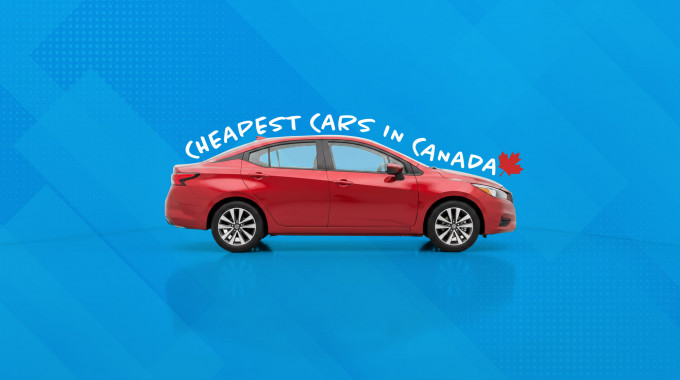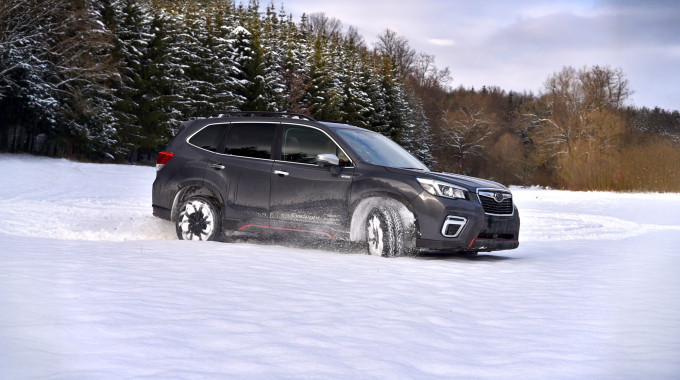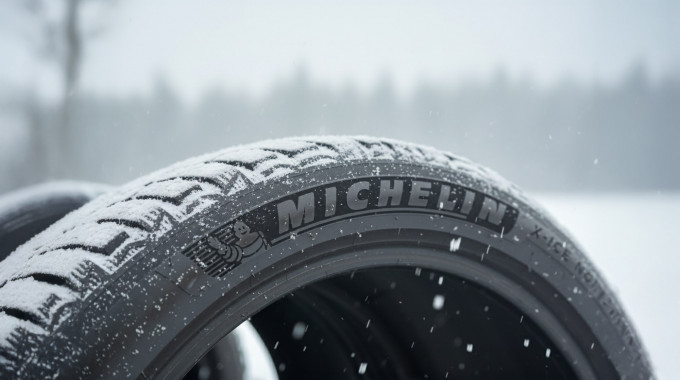
Review: Continental VikingContact 7 Winter Tire
We look at the Continental VikingContact 7 winter tire's key features, how they perform, and one attribute that left us the most impressed after 1,200 km of real-world testing. Here’s why these popular winter tires are ideal for your luxury SUV.
When shopping for a set of winter tires, your options are numerous and daunting. In 2023, winter tires cover a wide range of prices, features, performance levels, and speciality options. As more Canadians than ever seek out SUVs and electrified vehicles, the market landscape is shifting with more specialty and targeted tire products offered to cater to their changing needs and tastes.
If you’re in the market for a used SUV, check out our inventory here. Or all our pre-owned EVs and hybrids here.
For most of those shoppers, a few key performance attributes are must-haves from a quality set of winter tires. Aside from confidence-inspiring grip and traction, many are also hunting for a winter tire with solid wear performance, low noise levels, and extra after-purchase support.
The Continental VikingConatct 7 is a dedicated winter tire designed to meet these requirements—and during a recent test drive covering the gamut of winter driving conditions in Northern Ontario, a few attributes were especially notable.
Below, we’ll dig into what these tires are, how they work, how they perform, and one particular attribute that left us the most impressed after 1,200 kilometres of real-world testing.
VikingContact 7’s key features & sizes

Continental VikingContact 7 Winter Tire | Photo: Continental
Soft rubber compound to tackle extreme cold conditions
Introduced in 2018, Continental’s VikingContact 7 tires were positioned as an all-round winter tire designed for Scandinavian weather and road conditions. Key features include a soft rubber compound that intends to deliver excellent performance in extreme cold, as well as an interlocking tread design that’s highly visible from a mere glance. The connected system of treads and grooves rapidly evacuates slush and water, but interlock together on snow and ice for a more effective bite into the surface of the road.
Structural bars and bridges stiffen and reinforce the tread area
Though the soft rubber compound enhances performance in low-grip and low-temperature settings, structural bars and bridges are built into the tread surface, helping stiffen and reinforce the tread area and locking the tread blocks together. Compound additives including rapeseed oil and silica help further alleviate the effects of a soft compound.
The result is a tire with the grip benefits of a soft compound, alongside the precise and direct steering and handling of a stiffer tire compound.
In summary, drivers can expect the winter driving performance of a very soft compound winter tire, with none of the compromise to steering and handling response. These same optimizations have additional benefits in wet-road grip and braking situations, too.
Available Sizes
Available in sizes ranging from 15 to 22 inches, Viking Contact 7 tires represent a solid all-around value when considering their performance and price. Most owners rate these tires as 4/5 stars or higher, with many saying they have no complaints and would buy again.
Putting Continental’s all-round winter tire to the test

Continental VikingContact 7 Winter Tire | Photo: Continental
On our test drive, it wasn’t hard to see why.
During one road test segment including 3 hours of highway driving in heavy slush, our test tires made their first major positive impression. Slush-covered highways can be highly taxing to driver bandwidth, especially when heavy slush causes tugging and pulling at the steering, and easily unsettles the vehicle beneath the driver, resulting in squirming and slipping that can be startling and dangerous.
Taking on slush like a pro
On VikingContact 7 rubber, our 3-row, AWD-equipped SUV took a different approach to heavy slush. With a tread pattern optimized for the task, the VikingContact 7 rubber cut into the slush and blasted it at extreme pressure from the tire treads, rather than floating over top.
Steering remained stable and locked on, with no sensation of tugging, fighting, or other unwelcome feedback detectable through the wheels. Slush is evacuated with ease, allowing more of the tire to contact more of the road.
The result is above-average confidence and reduced driver workload and stress levels in this situation. Notably, the tires make a distinctive and satisfying sound when sending slush airborne at highway speeds.
If high performance in heavy slush is a prime consideration for you, be sure to check out the Toyo GSi-6 winter tire line as well.
Performance on hard-packed and icy surfaces

Continental VikingContact 7 Winter Tire | Photo: Continental
When it comes to acceleration on hard-packed or icy surfaces, the VikingContact 7 tires are among the best we’ve ever tested. With light throttle inputs, wheelspin and traction control intervention is nearly undetectable.
The tires also perform strongly when accelerating from a stop on sharp and icy inclines, where wheelspin and traction control interventions are minimized, and where drivers will feel strongly supported. Use of a dedicated winter tire gives your vehicle’s traction-enhancing systems more traction to enhance, this was perhaps most apparent during this portion of our test drive.
Here, the VikingContact 7 tires performed very similarly to favourites including Michelin X-Ice we reviewed and Bridgestone Blizzak.
During hard and spirited acceleration, we noted a gradual loss of traction and minimized drama from traction control systems, and the VikingContact 7’s still allowed our tester to cover ground quickly even with all four tires spinning and tossing powder into the air.
Though recovery from traction control interventions is quick and smooth, spirited or heavy-footed drivers may notice comparable Michelin X-Ice or Toyo GSi-6 tires to provide a slight edge in traction here.
Stopping abilities on freezing pavement

Continental VikingContact 7 Winter Tire | Photo: Continental
Emergency braking maneuvers on freezing pavement revealed another strong point: excellent bite and plenty of urgency transmitted to the driver when it’s time to get stopped as quickly as possible. A hard stop from highway speeds on ice-cold pavement provides two strong and confidence-inspiring signals to the driver’s brain.
First? A strong and abrupt initial bite the moment the brake pedal is slammed, with minimized softness and vagueness at the pedal.
Second? Late engagement of anti-lock braking, and minimized feedback during its operation. These are two subtle but important sensations that give drivers more peace of mind when it’s time to get stationary in a hurry.
The same stopping tests were repeated on hard-packed snow, as well as deep snow. Here, drivers can expect a slightly stronger initial bite from competitor tires like the Toyo GSi-6 and Bridgestone Blizzak, though our test vehicle did remain easy to control and maneuver while applying full stopping power to the ground, and overall stopping distances left us with no complaints.
Cornering and handling on snow-covered backroads
In cornering and handling on snow-covered backroads, the all-around performance of the VikingContact 7’s is revealing, with all performance traits coming into play. Though consistently reliable and able to provide peace of mind across widely-ranging conditions, we did leave these tires wishing for a touch more lateral grip for low-traction corners.
Steering feel and response in our test vehicle were excellent, though we noticed the rear end starting to lose its grip a little earlier than expected. This happens consistently and gradually, allowing drivers plenty of bandwidth to make corrections. Still, in this specific testing scenario, we’ve found other tires (Nokian Hakkapelliitta we reviewed here, Bridgestone Blizzak) a little grippier when leaning on them in corners.
We had no complaints about comfort, however.
Our top Continental VikingContact 7 attribute? Remarkably quiet and excellent ride comfort

Hyundai Palisade | Photo: Hyundai
Our tester, a 2023 Hyundai Palisade, delivered outstanding ride comfort over the roughest backroad surfaces we tested it on. Though largely a function of suspension and chassis tuning, the right set of winter tires is a key factor in maintaining the ride comfort and noise levels built into luxury vehicles from the factory.
This is why we’d strongly recommend the VikingContact 7 tires to luxury vehicle drivers concerned primarily with a comfortable and quiet drive: not only did our tires allow the excellent ride quality characteristics of our test-vehicle to shine through, they were also remarkably quiet.
In fact, after 1,200 kilometres, the noise levels proved one of the most impressive things about the VikingContact 7s, an observation backed up by many owner reviews.
These tires are designed to be very quiet, and they meet that design target very well. Used on a vehicle built to deliver similarly low noise levels, the resulting drive inspires plenty of confidence in slippery winter conditions alongside smooth and quiet highway cruising during fair winter weather, even at elevated speeds.
Therefore, shoppers looking for a winter tire that delivers poised performance across an extensive range of situations as well as a relaxing, smooth and quiet drive can expect to find the highest return on their investment.
If you’re set on a Continental winter tire, also read our Continental IceContact XTRM tire review here.







